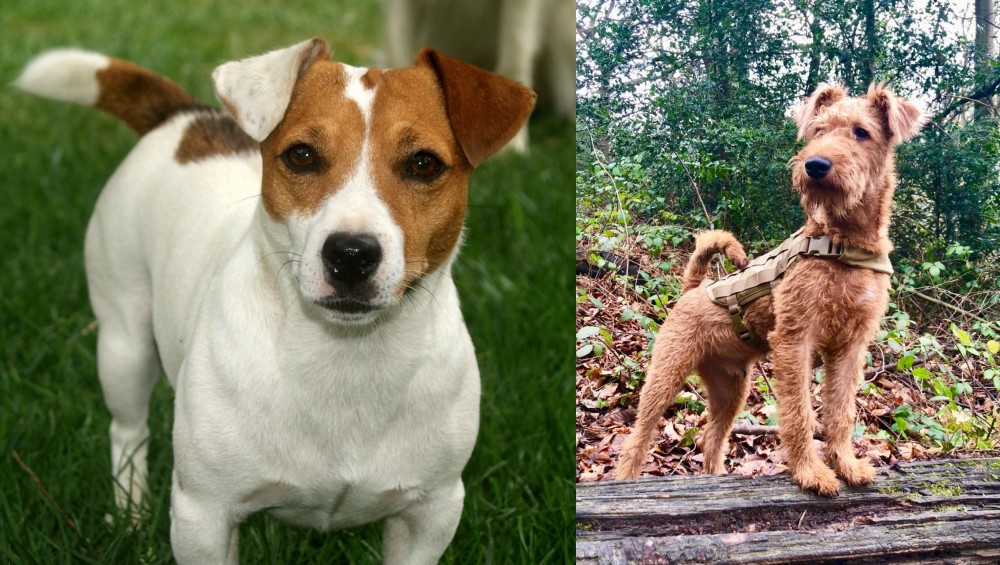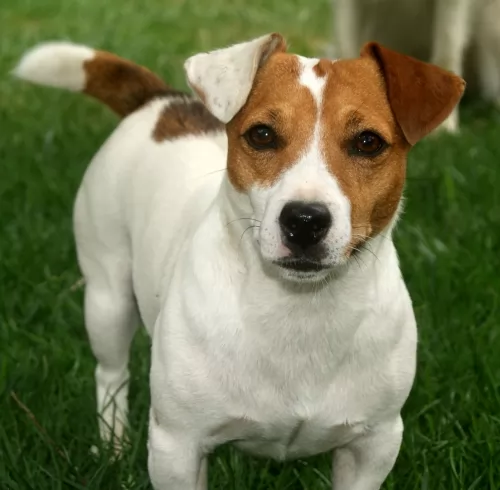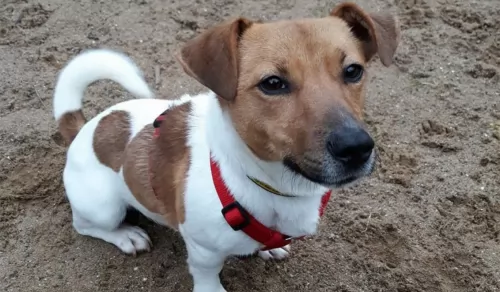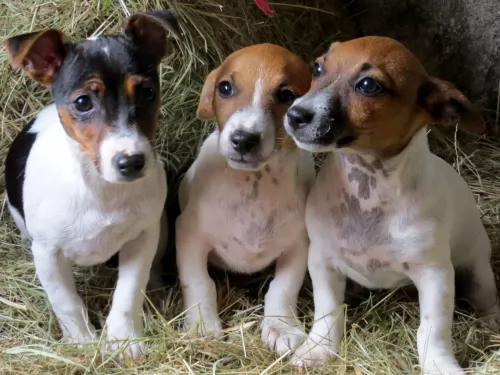 Petzlover
Petzlover Irish Jack Russell is originated from United States but Irish Terrier is originated from Ireland. Irish Jack Russell may grow 15 cm / 5 inches shorter than Irish Terrier. Both Irish Jack Russell and Irish Terrier are having almost same weight. Both Irish Jack Russell and Irish Terrier has almost same life span. Both Irish Jack Russell and Irish Terrier has almost same litter size. Irish Jack Russell requires Low Maintenance. But Irish Terrier requires Moderate Maintenance
Irish Jack Russell is originated from United States but Irish Terrier is originated from Ireland. Irish Jack Russell may grow 15 cm / 5 inches shorter than Irish Terrier. Both Irish Jack Russell and Irish Terrier are having almost same weight. Both Irish Jack Russell and Irish Terrier has almost same life span. Both Irish Jack Russell and Irish Terrier has almost same litter size. Irish Jack Russell requires Low Maintenance. But Irish Terrier requires Moderate Maintenance
 Originating in the United States of America, the Irish Jack Russell, also known as Short Jack Russells, was bred to bring about a calmer temperament and to also have a dog with shorter legs.
Originating in the United States of America, the Irish Jack Russell, also known as Short Jack Russells, was bred to bring about a calmer temperament and to also have a dog with shorter legs.
Always a working dog, breeders of the Irish Jack Russell wanted to create a dog with less of a hunting instinct in him and have a dog which would be more companionable.
These Irish Jack Russells look much like your regular Jack Russell but are more of a companion dog than a hunting dog. The Irish Jack Russell doesn’t adhere to any existing Jack Russell breed standard and isn't really recognized at major dog clubs and kennels. The truth of the whole matter is that there are different kinds of Jack Russells and different names given to them to differentiate between the taller Jack Russell and the short legged one. The shorter Jack Russell Terriers are known by many names such as Irish Jack Russell and Shorty Jack Russells.
 The Irish Terrier is a dog breed from Ireland and one of the many different terrier breeds there are.
The Irish Terrier is a dog breed from Ireland and one of the many different terrier breeds there are.
Nobody is too sure of the Irish Terrier's history but it is one of the oldest terrier breeds. It appears as if the dog breed was developed from a wheat colored terrier and the extinct black and tan terrier.
It was always a common practice to crop the ears of terriers, but in 1889 the Irish Terrier Club required that the ears remain uncropped. The first Irish Terrier was shown in 1881, and the first Irish Terrier registered with the American Kennel Club was in 1885. The Irish Terrier Club of America was founded in 1896.
 Irish Jack Russells are small dogs standing at roughly 18 to 35cm and weighing in the region of 5 to 8kg for both males and females.
Irish Jack Russells are small dogs standing at roughly 18 to 35cm and weighing in the region of 5 to 8kg for both males and females.
He looks much like your regular Jack Russell but he has shorter legs, and where the regular Jack Russell has an essentially white coat with orange-tan patches, the Irish Jack Russell can be solid tan or other color variations such as red, brindle, black and tan.
The coat can be short or fairly long and coarse. The Irish Jack Russell is a sturdy, compact dog with a flat skull, brown eyes and ears which are semi-erect, semi-floppy. He has a bright, alert, intelligent look on his face. The tail is set fairly high and has always been docked but these days it is inclined to be left long, taking away from the dog’s nice compact look.
The Irish Jack Russell is perhaps more placid than the regular Jack Russell and that is why he can adapt to life in the city or in the country. They’re intelligent dogs and therefore easy to train and have socialized.
Even though he is a small dog, training and socialization is important as he is a feisty, stubborn, know-it-all little dog. These are dogs which can become possessive of their owner and they can become quite aggressive when protecting their family. He is a highly trainable dog but it is important to have him trained as he tends to be aggressive with other dogs.
He is busy, active, happy and inquisitive and will require regular exercise to prevent him becoming restless and destructive. He has been a working terrier and he always wants to be busy.
 The Irish Terrier is a medium sized dog who stands between 45cm and 50cm and weighs in the region of 11 to 12kg. He has a short, dense, wiry double coat which is a red, golden, sandy, wheaten color.
The Irish Terrier is a medium sized dog who stands between 45cm and 50cm and weighs in the region of 11 to 12kg. He has a short, dense, wiry double coat which is a red, golden, sandy, wheaten color.
The ears of the dog are semi-erect/semi-floppy and the tail is held high and curved.The chest is deep and muscular and the front and back legs are strong, long and muscular.
The Irish Terrier is a companion dog today, even though he was once a guard- and hunting dog. He is an amicable dog while also being alert and active. He is also independent and strong-willed so he will require training and socialization as then he becomes obedient and relaxed and much easier to live with.
They're social dogs too, loving all the members of their human family, getting on well with children in the home.
 The Irish Jack Russell is a self-confident, energetic dog who will like nothing more than to be involved with everything you’re doing. The busier he is the better, and because he has strong hunting instincts you may find him digging in your garden for rats.
The Irish Jack Russell is a self-confident, energetic dog who will like nothing more than to be involved with everything you’re doing. The busier he is the better, and because he has strong hunting instincts you may find him digging in your garden for rats.
Have him trained and socialized if you want to avoid certain problems with him and remember to exercise him and provide him with the attention he craves.
He is a social dog and will pine away if you just leave him to get by on his own. Make sure that he becomes every bit as part of your family as everyone else and he promises to make you a loyal, devoted companion.
 Irish Terriers are good with people and want to be an active member of their human families.
Irish Terriers are good with people and want to be an active member of their human families.
They are active dogs and will require ongoing mental and physical stimulation. This is a lively dog, but he still loves to spend quiet time indoors with his family.
They’re intelligent dogs with a strong sense of loyalty towards their owner, making excellent family pets.
 Your Irish Jack Russell is a dog that doesn’t battle with too many health issues, but nonetheless you still need to watch out for common health problems.
Your Irish Jack Russell is a dog that doesn’t battle with too many health issues, but nonetheless you still need to watch out for common health problems.
Jack Russell terriers are generally a healthy breed that can live up to 14 years of age, but still every dog is prone to the more common dog problems such as hip dysplasia, bloat, ear infections and dental disease among others.
If your Irish Jack Russell is in pain, he is lethargic and sick, don’t delay – take him to the vet right away.
 The Irish Terrier is a healthy dog breed and you won't find yourself running to the vet often with him, but still he can land up with one of the common dog problems.
The Irish Terrier is a healthy dog breed and you won't find yourself running to the vet often with him, but still he can land up with one of the common dog problems.
It is always wise to be aware of hip dysplasia as this is a disease which can occur in all dog breeds and all dog ages. Also look out for eye diseases such as progressive retinal atrophy and cataracts as these can lead to blindness in your pet.
There is a disease known as cystinuria which is quite a concern with Irish Terriers. It’s an inherited kidney disease where increased amounts of arginine, lysine, amino acids cystine and ornithine are excreted in the urine.
In well-functioning kidneys, blood is filtered so as to create urine. Cystine is reabsorbed back into the bloodstream but with dogs affected with cystinuria they cannot reabsorb cystine back in their bloodstream, causing an accumulation in the urine. Dogs with cystinuria suffer inflammation of the urinary tract and can also develop urinary blockage and kidney failure. Immediate veterinary intervention is required.
 The Irish Jack Russell is an average shedder with his short or longish coat which is easy to groom, requiring a brush once or twice a week. His nails grow quickly too and they can get caught on something and cause him damage. Trim your pet’s nails to prevent this.
The Irish Jack Russell is an average shedder with his short or longish coat which is easy to groom, requiring a brush once or twice a week. His nails grow quickly too and they can get caught on something and cause him damage. Trim your pet’s nails to prevent this.
Feed your Irish Jack Russell good quality dog food each day. If you feed him commercially manufactured dog food, be certain to check the feeding instructions on the packaging.
He is a small dog, and overfeeding can be just as bad as under-feeding. It’s never a good idea to just go on and on feeding your pet dry or wet kibble day after day. Add in some cooked chicken, rice, pasta and vegetables as a treat and to also provide some variety for him.
Also a little bit of raw meat occasionally can do him the world of good and you’ll see the appreciation in his bright eyes and wagging tail.
 The coat of the Irish Terrier requires a brush twice a week to keep it bright. If you intend showing your dog, the coat will need to be stripped a couple of times a year to maintain the texture and color.
The coat of the Irish Terrier requires a brush twice a week to keep it bright. If you intend showing your dog, the coat will need to be stripped a couple of times a year to maintain the texture and color.
Other Irish Terrier owners take their dog to the groomers to have the coat clipped. The dog doesn't shed a lot and they are referred to as being somewhat hypoallergenic.
As with any other dog breed, other grooming needs with your Irish Terrier will include clipping the nails, checking his teeth for plaque build-up and checking inside the ears for infection.
If you're unsure how to perform these grooming procedures with your pet, simply ask your vet who will explain to you precisely how to ensure your dog remains in tip top condition.
He's a fairly active dog so you want to make sure that you are attending to his exercise needs. Take him for a walk every day, and if you've got a good sized garden, throw a ball for him. If you're a jogger you can count him in.
What you feed your Irish Terrier will depend a lot on his age and his activity levels. Every dog is a unique individual and nothing is set in stone regarding their diets. Just like people though, feeding him a lot of junk food will contribute to illness and shorten his lifespan.
He needs quality food. If you buy commercially manufactured food, make sure to read up on how much to feed him. Try and mix in some cooked chicken, brown rice and vegetables from time to time as well as some raw meat.
Learn to know what foods are toxic for him. Make sure he has a bowl of fresh, cool water constantly available to him.